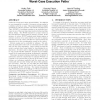Free Online Productivity Tools
i2Speak
i2Symbol
i2OCR
iTex2Img
iWeb2Print
iWeb2Shot
i2Type
iPdf2Split
iPdf2Merge
i2Bopomofo
i2Arabic
i2Style
i2Image
i2PDF
iLatex2Rtf
Sci2ools
136
click to vote
CODES
2007
IEEE
2007
IEEE
Compile-time decided instruction cache locking using worst-case execution paths
Caches are notorious for their unpredictability. It is difficult or even impossible to predict if a memory access results in a definite cache hit or miss. This unpredictability is highly undesired for real-time systems. The Worst-Case Execution Time (WCET) of a software running on an embedded processor is one of the most important metrics during real-time system design. The WCET depends to a large extent on the total amount of time spent for memory accesses. In the presence of caches, WCET analysis must always assume a memory access to be a cache miss if it can not be guaranteed that it is a hit. Hence, WCETs for cached systems are imprecise due to the overestimation caused by the caches. Modern caches can be controlled by software. The software can load parts of its code or of its data into the cache and lock the cache afterwards. Cache locking prevents the cache’s contents from being flushed by deactivating the replacement. A locked cache is highly predictable and leads to very ...
| Added | 02 Jun 2010 |
| Updated | 02 Jun 2010 |
| Type | Conference |
| Year | 2007 |
| Where | CODES |
| Authors | Heiko Falk, Sascha Plazar, Henrik Theiling |
Comments (0)

